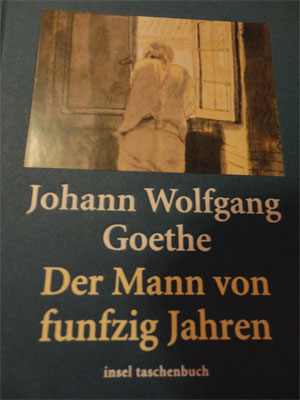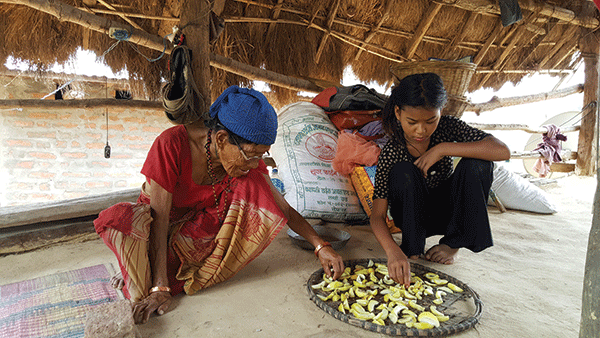It was in 1999 that Nutan Singh-Schäfer was asked by her employer, the Goethe Institute in Kathmandu, to do a translation work on the literary opus of German poet Goethe. “I thought to myself ´Why not?` and started doing some research on choosing something of his that would be most suited for a Nepali readership.” It became the first ever direct translation from a German literary piece into Nepali.
The occasion for the decision to bring classical German literature to Nepal was the 250th birth anniversary of the German writer, scientist and artist Johann Wolfgang von Goethe born in 1749 in Frankfurt, Germany. Goethe is considered one of the most influential writers of all times. His novels “The Sorrows of the Young Werther” (1774) as well as the tragedy “Faust” (1808) earned him international fame and made him popular within a cosmopolitan ordiance. Goethe´s oeuvre had a major effect on the 18th and 19thcentury and many ideas that he first brought up are now considered the foundations of different sciences.
The “Goethe Institute” is a non-profit organisation that promotes the knowledge and dissemination of German language and maintains cultural exchanges. The Institue was established in Kathmandu in 1978. Nutan Singh-Schäfer, who holds a diploma in teaching the German language from the Goethe Institute, has worked there as a Language Instructor for 16 years. Being the only Nepali possessing such sophisticated skills in the German language, she was happy to accept the challenge.
“Sure, it was not easy to choose the right piece to translate. The opus of Goethe is literally overwhelming. But finally I came across the novel ‘The Man of Fifty’ and immediately knew that this could be the right one to present to a Nepali readership,”says Nutan. The novel takes place in the 18thcentury and deals with a family affair where a man ‘of fifty’ years falls in love with a young girl. “The role of the family is still very important in a traditional country like Nepal. I knew that readers could identify with a plot where different interests lead to a rift within the family. Also the time when the story is set made the novel easily accessible for a Nepali readership. People remember what life was like then,”adds Nutan.
 In the Nepali schools’ curriculum, it is mainly the literary work of Indian writers like R. K. Narayan and R. Nath Tagore that are covered besides Nepali works. Also English or American authors are increasingly approached in classrooms. But most of the classical European literature that has significantly influenced Western society and therefore our world has largely been ignored. “There is more to literature of the West than Shakespeare and Dickens,”says Nutan. Countless writers have had major impact on the ideologies that now form our understanding of modern society. Democracy and the values incidented to this political system like freedom, equality and tolerance happened to be born through the literary opus of the Western authorial community. Johann Wolfgang von Goethe has been an important influencer of the intellectual movement in the Western world since the 18thcentury.
In the Nepali schools’ curriculum, it is mainly the literary work of Indian writers like R. K. Narayan and R. Nath Tagore that are covered besides Nepali works. Also English or American authors are increasingly approached in classrooms. But most of the classical European literature that has significantly influenced Western society and therefore our world has largely been ignored. “There is more to literature of the West than Shakespeare and Dickens,”says Nutan. Countless writers have had major impact on the ideologies that now form our understanding of modern society. Democracy and the values incidented to this political system like freedom, equality and tolerance happened to be born through the literary opus of the Western authorial community. Johann Wolfgang von Goethe has been an important influencer of the intellectual movement in the Western world since the 18thcentury.
Nepal is a country in transition on its way to forming a stable democratic political system. It opened its borders more than 60 years ago and is now becoming a solid part of the international community. An increasing number of young Nepalese are going to the West to receive their education and tourism is also playing an important role in the economy. There is no doubt: the cross-cultural dimension has become a reality in Nepal. It takes time to get adjusted to the changes that are showing its initial effects on a country that has such a strong identity and unique culture. The traditions that are practised as a part of the everyday life prove how pristine Nepal still is compared to other parts of the world.
Literature has the power to open up new cultures and ideas to a diverse ordiance. It can help create a deeper understanding of the changing world that surrounds us. “Literature is the most mighty tool that mankind posesses. It keeps its relevance over centuries and can be interpreted differently by every single person,” says Nutan adding,“By bringing Goethe to a Nepali readership I aim to promote the universal literature of a cultural sphere that is slowly also becoming a part of our culture. Young people should encounter the literature of the Western world early in order to sharpen their understanding of it and also to enhance a cosmopolitanism that they will need in their professional future. It is just a small part of Western culture that has been made accessible to a Nepali ordiance by Nutan Singh-Schäfer but it is an important step towards an open-minded future for the country. Ultimately it is not just about opening borders, but about opening our minds.











